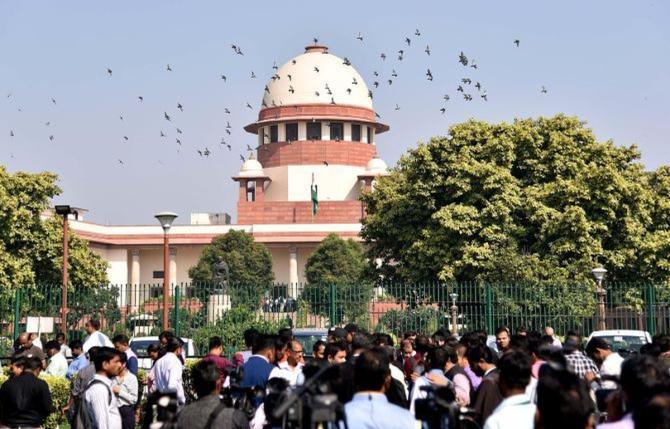Observing that receiving foreign donation cannot be an “absolute or even a vested right”, the Supreme Court on Friday upheld the constitutional validity of amendments made to the Foreign Contribution (Regulation) Act in 2020, adding the "strict regime" had become essential because of the past experience of "abuse and misutilisation" of foreign contributions.

Clearing the amendments to the 2010 Act meant to strictly regulate the foreign funding of the NGOs, the top court also said it is open to a sovereign democratic nation to completely prohibit acceptance of foreign donation on the ground that it undermines the constitutional morality of the nation.
The court said foreign contribution can have a material impact on the socio-economic structure and polity of the country, and that permitting its inflow ,which is a donation, is a matter of policy of the State backed by law.
“Receiving foreign donation cannot be an absolute or even a vested right. By its very expression, it is a reflection on the constitutional morality of the nation as a whole being incapable of looking after its own needs and problems."
The court noted that foreign aid can create the presence of a foreign contributor and “influence” the policies of the country and may tend to influence or impose a political ideology, and said the charitable associations may instead focus on donors within the country to obviate the influence of foreign countries.
“There is no dearth of donors within our country,” a bench headed by Justice A M Khanwilkar said while upholding the validity of certain amendments to the provisions of the Foreign Contribution (Regulation) Act, 2010, which came into effect in September 2020.
“Indeed, charitable activity is a business."
The court noted that third world countries may welcome foreign donation, but it is open to a nation, which is committed and enduring to be self-reliant and variously capable of shouldering its own needs, to opt for a policy of complete prohibition of inflow or acceptance of foreign contribution (donation) from a foreign source.
It said many recipients of foreign contributions had not utilised the same for the purposes for which they were registered or granted prior permission under the Act and that many recipients had also failed to adhere to and fulfil the statutory compliances.
"...the strict regime had become essential because of the past experience of abuse and misutilisation of the ‘foreign contribution' and cancellation of certificates of as many as 19,000 registered organisations on the ground of being grossly non-compliant,” the court said, declaring that the amended provisions of Sections 7, 12(1A), 12A, and 17 of the 2010 Act are intra vires the Constitution.
The 132-page verdict by the bench, also comprising Justices Dinesh Maheshwari and C T Ravikumar, was delivered on pleas, including those assailing the constitutional validity of the amendments to provisions of FCRA 2010, vide the Foreign Contribution (Regulation) Amendment Act, 2020 which came into effect on September 29, 2020.
However, the top court read down section 12A and construed it as permitting the key functionaries or office bearers of the associations/NGOs, who are Indian nationals, to produce Indian passports for the purpose of their identification.
Section 12A mandates a person, who seeks prior permission or prior approval under section 11 or makes an application for grant of certificate under section 12 of the Act, including for renewal of a certificate under section 16, to provide the Aadhaar number of all its office bearers or directors or other key functionaries as an identification document.
The top court, which adverted to the legislative history culminating with the 2010 Act, noted that serious concern about the impact of widespread inflow of foreign contributions on the values of a sovereign democratic Republic had been repeatedly expressed at different levels including in Parliament.
“To eradicate misuse and abuse of foreign contribution in the past, despite the firm regime in place in terms of the 2010 Act, the Parliament in its wisdom has now (vide Amendment Act of 2020) adopted the path of moderation by making it mandatory for all to accept foreign contribution only through one channel and to utilise the same ‘itself' for the purposes for which permission has been accorded,” it said.
It said the sovereignty and integrity of India ought to prevail and the rights enshrined in Part III of the Constitution must give way to the interests of the general public much less public order and the sovereignty and integrity of the nation.
“In fact, the Parliament must be credited with for having taken recourse to corrective dispensation for eradicating the mischief, which any sovereign country can ill-afford."
The court said the Statement of Objects and Reasons for the Amendment Act makes it amply clear that the annual inflow of foreign contribution had almost doubled between the years 2010 and 2019 and many recipients of foreign contribution had not utilised the same for the purposes for which they were registered or granted prior permission under the Act.
It noted that the amended section 7 postulates complete prohibition on the transfer of foreign contribution to other person, not even to a person having the certificate of registration under the Act.
The court said in the absence of such stringent provision, some of the recipient organisations were reportedly indulging in the successive chain of transfers to other organisations, thereby creating a layered trail of money and also utilisation of funds towards administrative costs of successive transfers up to fifty per cent leaving very little funds for spending on the purposes for which it was permitted.
“The question to be asked is: ‘in normal times, why developing or developed countries would need foreign contribution to cater to their own needs and aspirations? Indisputably, the aspirations of any country cannot be fulfilled on the hope (basis) of foreign donation, but by the firm and resolute approach of its own citizens to achieve the goal by sheer dint of their hard work and industry,” it added.










